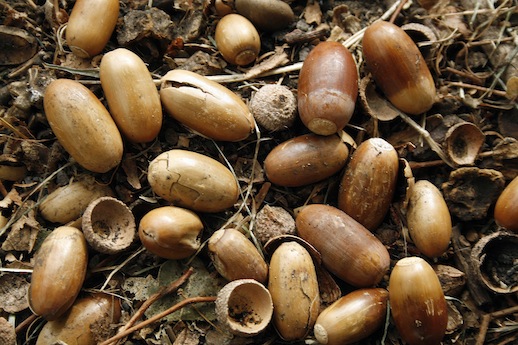In which, as the year comes to its end, our friends and collaborators look back and share their moments:
It’s been a ‘mast year’, the ground beneath the oaks on Tooting Common brown and rolling with acorns, the bramble thickets in the city park near my house heavy with blackberries. It’s the lovely storehouse created by a long summer, the first we’ve had in ages – or so it feels. Mice and voles boom in a mast year, as do the creatures that depend on them; next year more saplings will unhouse themselves from their seed casings and reach skywards. The end product of spring’s fecundity and the conclusion of the year’s cycle, the autumn’s harvest is both an end and a beginning.
In January of this year I published my first novel, Clay. It was simultaneously the end of the book’s long journey into print, and the start of my life as a ‘real’ writer: although the book was finished in 2010, and the contract signed, January 2nd 2013 (dark and cold; too close to New Year for a launch party) was the moment when the years of writing came to fruition and I became something other than I had been before. ‘I’m a writer,’ I began to say, for the first time. It felt strange, at first; it doesn’t feel strange now.
Much of the year has been spent learning. Learning how to give a public reading, how to answer questions from people who have taken the time to read what I began so tentatively to write five years ago. Learning the kind of questions people ask, learning what it is that they want from you – which may be two different things. Caught by the River has been a big part of that, from my first reading (the Queen’s Head, January 22nd) to my first festival (Field Day in May – brilliantly bonkers) and my first ‘In Conversation’ (with the utterly awesome Evie Wyld, in September). To be able to work out, in friendly and supportive company, how to be a writer – not the writing part, but the public, being part, which nobody prepares you for – has been a gift.
The year has brought other kinds of learning, too. The darker thread coiled about the bright braid of words has been the challenge of coming to terms with my father’s dementia, and finding a new way to live in the slowly fading light of my relationship with him. Yet even this end is also a beginning, as I learn – with my family – to forge new ways of being with him and keeping him safe. It’s a lesson in compassion, and although it’s hard, I know I’m better for it. These, after all, are the ways in which we grow.
But 2013 hasn’t all been about change. I spent much of August looking after a friend’s house, dog and hens on Shreen Water in Dorset, as I have for the previous three years. It’s a beautiful stone house with a long history, a startlingly fecund vegetable patch and a gloriously tangled stretch of riverbank, and it seems never to change from visit to visit. The family departs by car for sunnier climes, their children a little taller each year, a little more articulate, and I take possession. When they return two weeks later, tanned and sandy, I struggle to hand the house back.
But South London beckons, and the truth is that as much as I love Dorset I’d be restless in real, deep country. I’ve come to know myself more in the last two years than at any other time in my life, and it’s clear to me these days that I prefer a bit of itch, a lack of ease; I need to be uncomfortable and between worlds in order to feel like myself. Belonging somewhere – really belonging – feels both beguiling and dangerous. It’s something I’ve been exploring in my second book.
And that is how the year is ending: with the completion of another manuscript. Begun in 2011, soon after Clay was finished, born from something I scribbled down over a decade ago but with its roots in a daydream from early childhood, these pages are the end of a long thread of thinking and feeling – and the start of a new novel’s journey to the shelves (I hope). Endings and beginnings, and how to tell one from the other: this is what the year has held for me. Change is the harvest I’m still learning to bring home.
